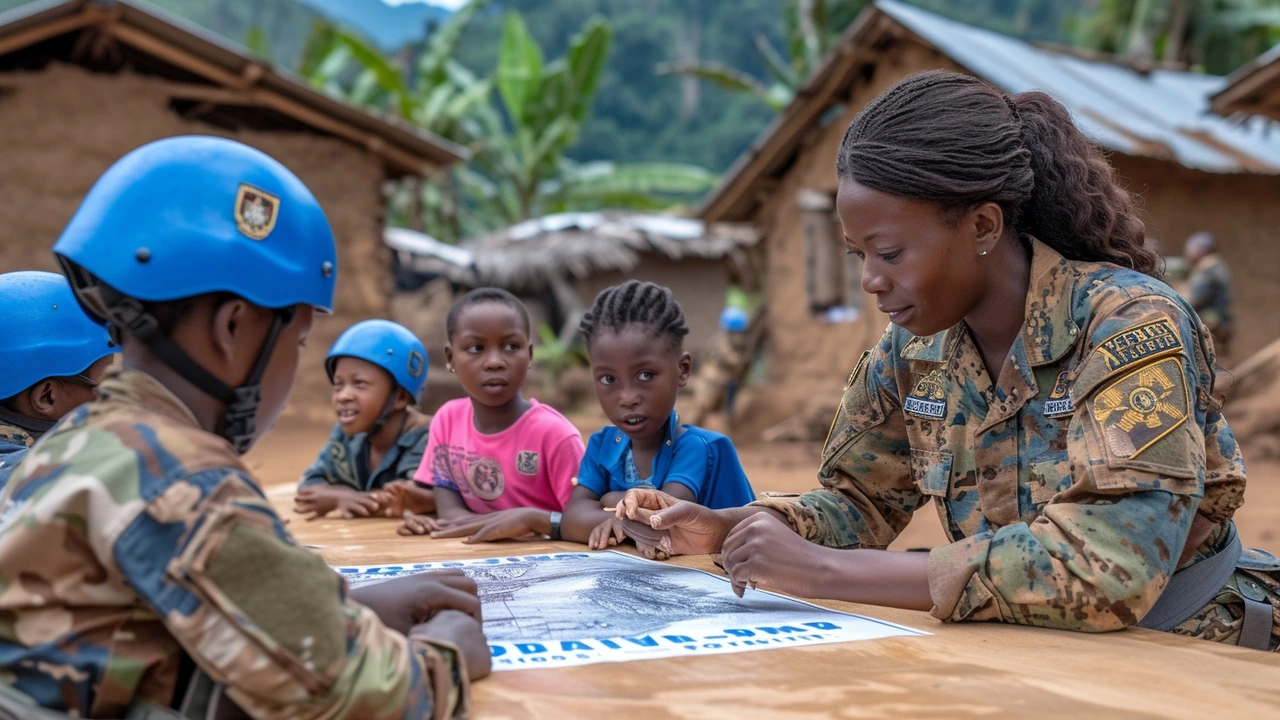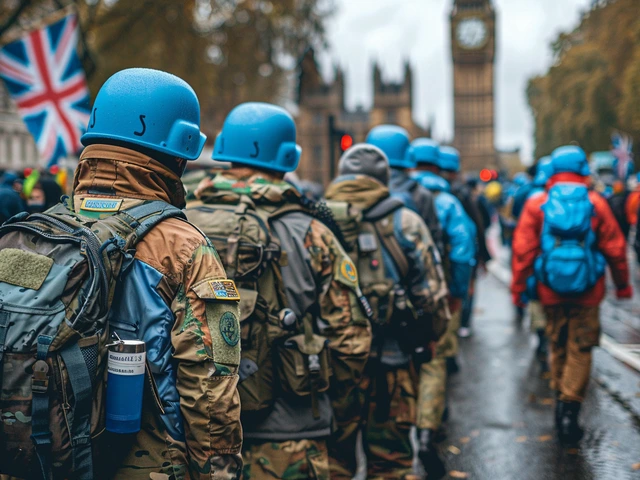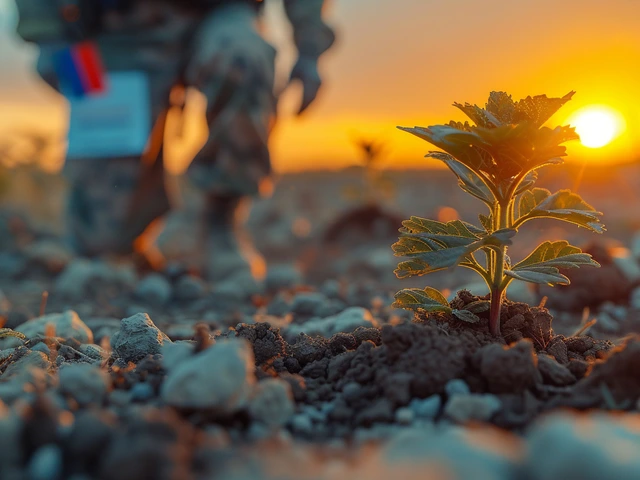Introduction to Peacekeeping and Its Role in Community Development
When we talk about peacekeeping, it's easy to imagine it as a concept reserved for international conflicts — blue helmets stepping into war-torn regions. However, the essence of peacekeeping extends far beyond, playing a vital role in nurturing the roots of community development. It's about creating an environment where economic, social, and infrastructure development can take place unhindered by the chaos of conflict. Through fostering a sense of security and stability, peacekeeping initiatives lay the groundwork for communities to flourish.
Peacekeeping's contribution to community development is multifaceted, encompassing everything from resolving disputes and reducing violence to encouraging political participation and economic cooperation among community members. These efforts are crucial for paving the way toward a prosperous society where everyone has the opportunity to contribute and benefit. By understanding this connection, we can appreciate not only the immediate benefits of peacekeeping but its long-term impacts on building resilient, thriving communities.
Building Social Cohesion Through Peacekeeping Efforts
At the heart of community development lies social cohesion — the bond that holds a society together. In areas where conflicts have frayed the social fabric, peacekeeping efforts are essential in stitching these communities back together. Initiatives aimed at reconciliation and healing help mend relationships and foster a sense of belonging among community members. Through workshops, dialogue sessions, and community events, peacekeeping missions actively work to bridge divides, cultivate mutual understanding, and build trust. This renewed sense of community is critical for collaborative efforts in development and for the general well-being of the population.
Moreover, peacekeeping contributes to social cohesion by addressing root causes of conflicts such as inequality and discrimination. By promoting fairness, justice, and inclusivity, peacekeeping initiatives ensure that all community members feel valued and heard. This not only aids in healing past wounds but also builds a strong foundation for future cooperation and harmony. As social ties strengthen, communities become more resilient against internal and external shocks, making peacekeeping a cornerstone of sustainable development.
Enhancing Security and Stability for Economic Growth
Security and stability are prerequisites for any form of economic development. In areas affected by conflicts, the fear and uncertainty can stifle investment, disrupt markets, and impede access to resources. Peacekeeping missions play a critical role in restoring order and providing the necessary security for economic activities to resume and thrive. By ensuring the safety of citizens and protecting property rights, peacekeeping enables businesses to operate, markets to develop, and communities to engage in productive work. This, in turn, kickstarts economic recovery and growth, providing jobs and improving living standards.
Moreover, the presence of peacekeeping forces can attract external investments, as investors are more likely to engage in regions where their assets are protected. This inflow of capital can be a significant boost to local economies, encouraging further development and prosperity. In addition, peacekeeping missions often support infrastructure development projects — from rebuilding roads and bridges to restoring utilities — essential for economic activities and improving the quality of life in communities. As a result, peacekeeping not only contributes to immediate security needs but also lays the foundation for long-term economic stability and growth.
Strengthening Governance and Political Participation
Effective governance is a cornerstone of community development, ensuring that the needs and interests of the population are addressed. Peacekeeping initiatives often include supporting local governance structures, strengthening institutions, and promoting civic participation. By fostering transparent, accountable governance, peacekeeping helps build public trust in institutions, which is crucial for social cohesion and stability. Furthermore, peacekeeping missions engage in capacity-building activities, training local officials in areas such as public administration, finance, and conflict resolution.
Peacekeeping also plays a critical role in enhancing political participation by encouraging dialogue and cooperation among diverse groups. Through supporting free and fair elections, fostering inclusive political processes, and facilitating civic engagement, peacekeeping missions empower communities to take an active role in shaping their future. This increased political participation not only ensures that development efforts reflect the community's needs and aspirations but also reinforces the legitimacy of governance structures, contributing to a more stable and harmonious society.
Facilitating Access to Education and Health Services
In conflict-affected regions, access to essential services like education and healthcare often becomes a casualty. Peacekeeping missions, recognizing the importance of these services in community development, work to protect and restore access to them. By providing security and rebuilding infrastructure, peacekeeping enables schools and health facilities to operate safely. This is crucial not just for immediate well-being but for laying the foundations of future development. Educated and healthy populations are better equipped to contribute effectively to their communities and economies.
Furthermore, peacekeeping efforts often involve collaborating with humanitarian organizations to deliver essential services in the most affected areas. This collaboration ensures that aid reaches those who need it most, bridging gaps in service delivery and helping to stabilize communities in the aftermath of conflict. As peace and normalcy return, the focus shifts to building sustainable systems for education and healthcare that can support long-term development. Peacekeeping, therefore, plays a pivotal role in not only meeting immediate needs but also in building the capacity for communities to thrive independently.
Promoting Sustainable Development and Environmental Protection
Sustainable development is increasingly recognized as a critical component of community prosperity. Peacekeeping missions contribute to this by integrating environmental protection and sustainability into their strategies. In regions where natural resources have been a factor in conflicts, peacekeeping efforts aim to manage these resources responsibly, ensuring fair access and promoting sustainable use. This not only addresses immediate environmental concerns but also prevents future conflicts over resources.
Additionally, peacekeeping initiatives often support projects aimed at environmental restoration, such as reforestation, water management, and conservation activities. These projects not only help heal war-torn landscapes but also provide communities with the means to develop sustainably. By focusing on renewable resources and sustainable practices, peacekeeping missions help communities navigate the challenges of development without compromising their environment, ensuring a healthier planet for future generations.
Conclusion: The Path Forward
The role of peacekeeping in community development is profound and multifaceted. From enhancing security and fostering social cohesion to promoting economic growth and supporting governance, peacekeeping lays the groundwork for sustainable, inclusive development. As communities around the world continue to face the challenges of conflict and underdevelopment, the importance of effective peacekeeping strategies cannot be overstated. By building on the successes of peacekeeping efforts and learning from past challenges, we can pave the way for more resilient, prosperous communities. The path forward is one of collaboration, innovation, and unwavering commitment to peace and development.








Write a comment